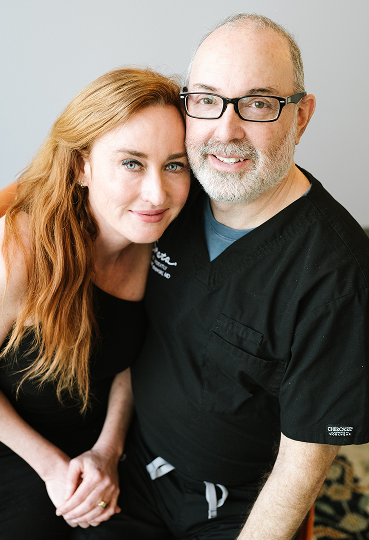How does liposuction work?

Liposuction continues to be one of the most popular aesthetic procedures in the United State, but there is surprisingly little information on how it actually works. So here is our “all you need to know” guide!
The treatment also referred to as lipo, lipoplasty, or liposculpture suction is a micro surgical procedure that eliminates excess fat from below the skin. This type of cosmetic surgery is most commonly used on and around the stomach, legs, neck, chin, upper arms, and back.
Liposuction is performed in our office by Dr. Janowski and involves using a cannula, or narrow tube, to vacuum fat from the body. Patients can opt to have lipo alone or along with another cosmetic treatment, such as a nonsurgical facelift, abdominoplasty, or breast reduction surgery.
Is Liposuction Right for You?
Aesthetic procedures used advanced technology that can help you optimize your physique, boost your confidence, and enhance your mental health. However, it’s not magic. People who have extreme anticipations of what liposuction can do for them may be disappointed.
For example, this surgery is not a substitute for diet and exercise. If you have a diligent health regimen and can’t seem to get rid of pockets of fat in certain areas, however, you may be an excellent candidate.
 People with medical conditions such as diabetes, high blood pressure, vascular problems, immune deficiencies, or cardiac issues should not undergo this procedure. If you need to reduce fat all over your body, you may not be eligible for lipo. Once you lose some weight and develop a regular exercise and diet regimen, you might be able to opt for the treatment.
People with medical conditions such as diabetes, high blood pressure, vascular problems, immune deficiencies, or cardiac issues should not undergo this procedure. If you need to reduce fat all over your body, you may not be eligible for lipo. Once you lose some weight and develop a regular exercise and diet regimen, you might be able to opt for the treatment.
Some other factors that would enhance the likelihood that liposuction would work for you include:
- You are not obese and are within 30 percent of your goal weight
- Your skin is firm and elastic
- You have a reasonable muscle tone
- You are in good health overall
- You are generally fit
- You are a non smoker
How does liposuction work for smoothing out the skin’s cottage-cheese texture? This surgery will not remove cellulite. It cannot eliminate dimples or stretch marks.
It does remove fat cells from the body. However, the fat cells that remain can expand if you don’t continue a healthy lifestyle after you undergo the procedure.
The results are subtle. Liposuction sculpts the contours of your body to produce a sleeker silhouette.
If you need to reduce fat all over your body, you may not be eligible for lipo. Once you lose some weight and develop a regular exercise and diet regimen, you might be able to opt for the treatment.
What Does the Liposuction Process Entail?
How does liposuction work?
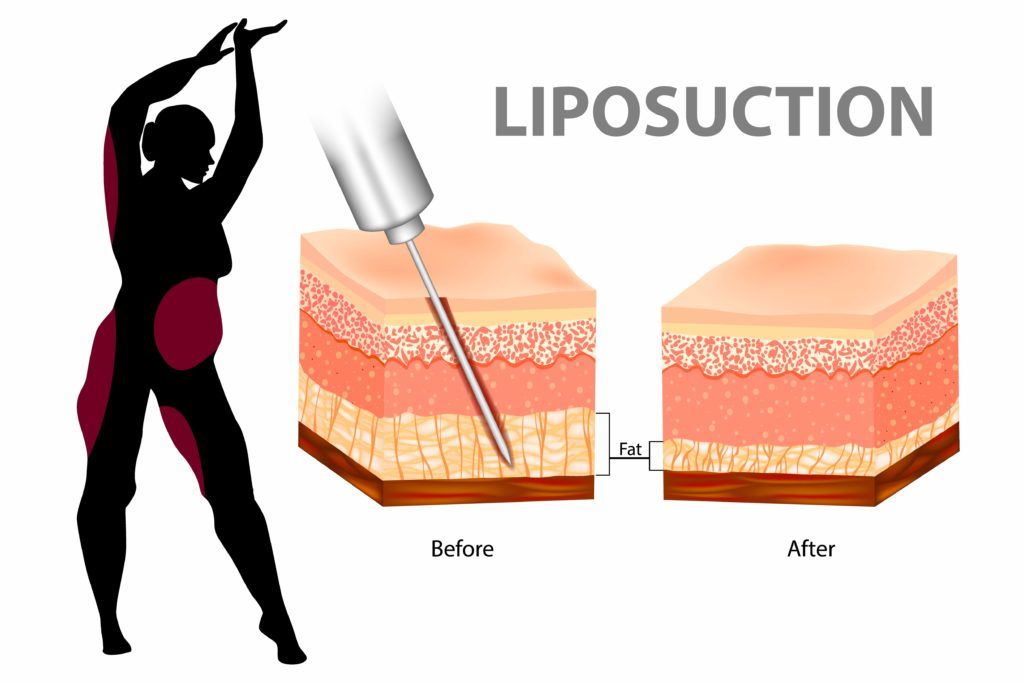 This cosmetic procedure begins with a consultation. You’ll typically meet with the surgeon to ask questions, define your goals, and learn what to expect. Many practices offer free, no-obligation consultations. That’s a good time to go over any concerns that you have.
This cosmetic procedure begins with a consultation. You’ll typically meet with the surgeon to ask questions, define your goals, and learn what to expect. Many practices offer free, no-obligation consultations. That’s a good time to go over any concerns that you have.
Once you decide to move forward, you will prepare for the surgery. Your practitioner will tell you what to do before the procedure. You may need to change your diet or alter your medication schedule temporarily.
Smoking increases the risk of complications. Patients are asked to stop smoking for at least two weeks before the procedure. If you can’t do this, you may not be able to undergo lipo.
You may need to refrain from using some over-the-counter anti-inflammatory medications, such as aspirin. Women may not be able to take a contraceptive pill, and people with anemia may have to take iron supplements.
Some supplements may also be prohibited. Check with your doctor if you’re taking herbal remedies or vitamins.
How Long Does Liposuction Take?
The procedure takes approximately one to four hours.
 The surgery is typically an outpatient treatment, which means that you’ll return home the same day. If you have liposuction over a larger area, you may need to stay at the hospital overnight. You won’t be allowed to drive yourself home. Make sure that somebody can pick you up or accompany you to the office.
The surgery is typically an outpatient treatment, which means that you’ll return home the same day. If you have liposuction over a larger area, you may need to stay at the hospital overnight. You won’t be allowed to drive yourself home. Make sure that somebody can pick you up or accompany you to the office.
The procedure itself is very tolerable, as once the area to be treated is numbed, most patients feel almost nothing. Upon request, we will provide you with oral sedatives – just to help you relax during the procedure, and we insist that you have a ride home post-treatment.
If you are numbed locally, you’ll be awake during the procedure. However, you won’t feel it.
Some surgeons use local anesthesia when they’re treating a small area. Being awake during the procedure allows you to stand up, which can help the surgeon remove the fat properly.
Different Liposuction Techniques
Depending on your situation, you may opt for one of the following types of liposuction:
- Tumescent– The most popular option, which involves injecting the area with a numbing saline solution and removing fat using a cannula and vacuum.
- Dry– This technique is not commonly used; it requires the use of a cannula without a saline solution, which increases the risk of bruising and bleeding.
- Power-assisted– The cannula has a mechanism that moves it back and forth quickly during the treatment, disengaging the fat cells.
- Ultrasound-assisted– The energy from sound waves breaks the walls of the fat cells, turning it to liquid so that it can be vacuumed.
- Laser-assisted– Sometimes called SmartLipo, this requires a laser to liquefy the fat.
Tumescent liposuction doesn’t require surgeons to use stitches to close the wounds. The incisions are left open to facilitate drainage. When excess blood and fluids can escape through those areas, the risk of swelling goes down. The tumescent technique also reduces the risk of blood clots.
With this technique, the incisions are tiny. Therefore, the risk of infection also goes down. Patients don’t have to worry about reacting to the sutures. The tumescent method also reduces inflammation. Non-sutured incisions typically heal just as well as those with stitches.
What Are the Benefits of Liposuction?
Liposuction is generally used to enhance the appearance. It works exceptionally well in areas that are resistant to reduction through diet and exercise. When it’s not used for cosmetic purposes, lipo can help with some other conditions.
For example, it can reduce the discomfort associated with lymphedema, long-term swelling in the tissues. It is also used to remove fat deposits from the breasts, especially in men with gynecomastia. This procedure can eliminate lipomas, which are fatty tumors under the skin.
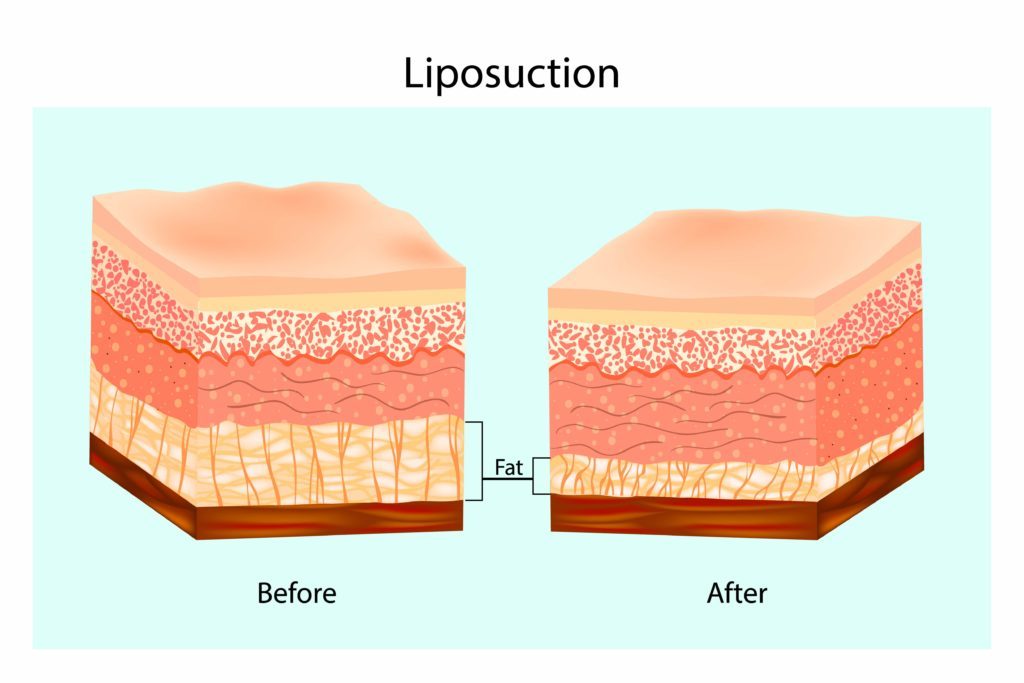
The procedure is permanent. The fat cells that are removed will never grow back. However, other fat cells can grow, and fat can build up in other areas of your body. Therefore, it’s essential to focus on your health after surgery.
What to Expect Afterward
Liposuction recovery is straightforward. After the surgery, you can usually return home. However, you need to rest and take care of yourself. You may be sore. Your skin may feel bruised and tender. This discomfort should diminish within about 48 hours.
The surgeon will usually give you a support or compression garment after the surgery. Follow the practitioner’s instructions for using this. You may need to use it for a week or up to two months. You can ask your practitioner whether you’ll need bandages or stitches after the treatment too.
Keep your incisions dry. You can shower two days after the procedure.
You should take any medications that the doctor has prescribed. In some cases, you may have to take antibiotics to reduce the risk of infection. Your practitioner may also give you a painkiller to help you stay comfortable.
Although you shouldn’t exert yourself or do vigorous physical activity for about three weeks following the treatment, you should be able to return to your regular routine within a few days. The healing process is different for everyone, though.
Your doctor will give you specific instructions for caring for the incisions, taking medications, and resting. Find out when you should return for a follow-up appointment.
Is Liposuction Safe?
There are always risks associated with surgery. However, complications with liposuction are rare.
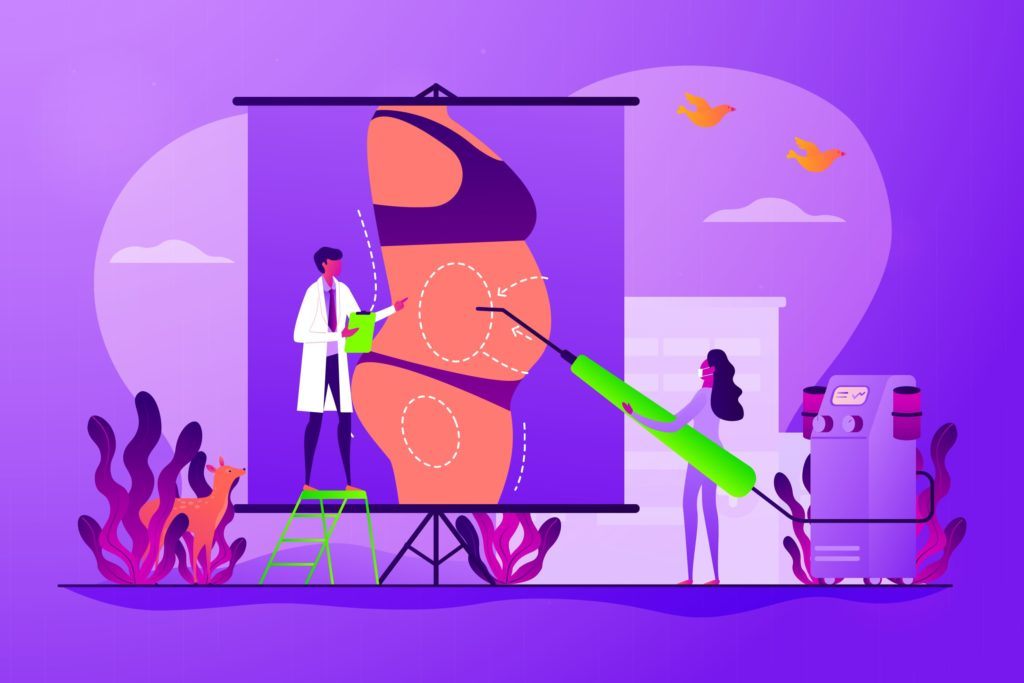
Some of the adverse reactions that can occur immediately after the procedure include bleeding under the skin, swelling, blood clots, fluid in the lungs, fat emboli, skin cell death and heart and kidney problems. During recovery, some people experience fluid imbalances, difficulty healing, wavy or dimpled skin texture, scarring, and skin color changes. If you feel you are experiencing any of these complications, please contact us immediately!
It’s normal to feel numb in the area where the fat was removed. Nerve fibers are disturbed during surgery, and they will function normally within a few weeks. For some people, the numbness remains for up to six months. You might experience tingling as the sensation returns.
Bruising and swelling are also common after lipo. These side effects are most intense on the first and second day. They will dissipate within about two weeks.
People with health problems that affect the way that they heal may not be candidates for this surgery. They run a higher risk of developing an infection or misshapen areas. Tell your surgeon if you have conditions such as HIV or are undergoing chemotherapy.
If the treated area appears irregular, contact your doctor. However, this may not be a concern. Your body may be inflamed as it tries to repair the fat cells that were injured during the procedure. The contours should smooth out once the body reabsorbs these cells.
Although there are risks with this surgery, complication rates are low. Serious issues happen in fewer than 1,000 patients. People who have more significant amounts of fat removed tend to have more adverse reactions.
Is Liposuction Painful?
If you have decided to undergo the procedure, you might wonder, “Is liposuction painful?” You shouldn’t feel a thing during the surgery. You’re almost guaranteed to have pain after the surgery, though.
The pain should peak approximately two to four days after the treatment. Your doctor will recommend the appropriate medication, and you should take it according to their instructions. Don’t use any pain medications that you haven’t cleared with your surgeon.
Some over-the-counter analgesics can elevate the risk of bruising and drainage. You shouldn’t take any medications that will interfere with blood clotting.
A compression garment can reduce pain because it supports the treated areas. It should be tight but not uncomfortable. If you wear it too snugly, it could restrict blood flow and impede healing.
Don’t use warm or cold compresses on the painful areas. Because your skin will probably be numb, you could burn yourself or get frostbite if you’re not careful.
How Long Does It Last?
Something worth mentioning in this “How Does Liposuction Work” discussion is the fact liposuction removes your fat cells for good. However, that doesn’t mean that you won’t gain weight again. The surgery can’t eliminate all your fat cells. In fact, it’s only safe to remove a limited amount.
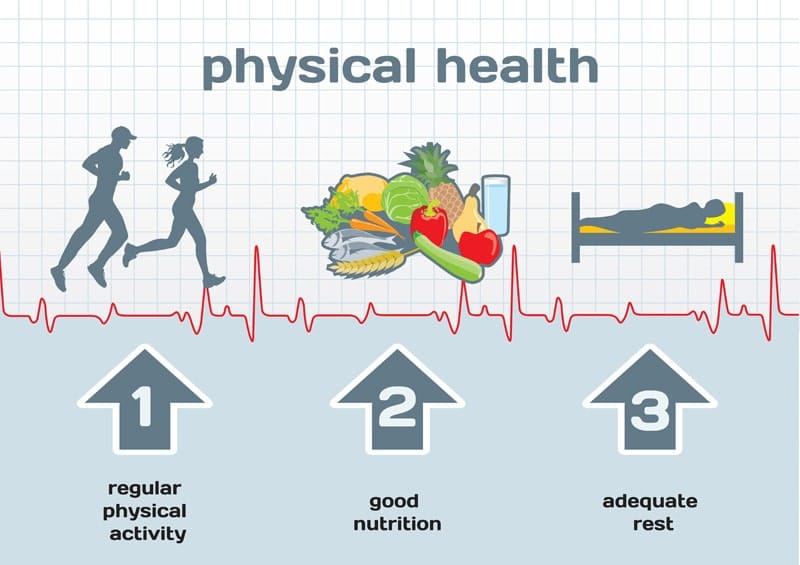
The best way to keep the fat off after surgery is to maintain a healthy lifestyle. Focus on eating nutrient-dense foods. You don’t necessarily have to consume a low-fat diet. There are plenty of healthy fats that benefit your health in a variety of ways.
That means that you can still accumulate fat on your body. The cells in the same area can grow larger, creating pockets of fat where the liposuction was performed. For many people who don’t take care of their bodies after lipo, fat gathers in different areas.
Those fat cells may collect deeply below the skin. This type of fat is hazardous if it grows around organs, such as the liver or heart.
Pass up foods with empty calories. Those include products with a great deal of sugar, carbohydrates or fat and few other nutrients. Many people don’t realize that overeating sugar encourages the body to store fat.
Does Insurance Cover Liposuction?
Rounding up on our post, How Does Liposuction Work, we’d like to mention that most health insurance providers don’t cover this procedure because it is cosmetic. Give us a call and we can chat about payment options.
How Does Liposuction Work? — Summary
There you go, everything you ever wanted to know about the liposuction process. If you have any questions concerning it, please call 303-469-0064. Our staff will be very happy to answer them for you.
*Results may vary from patient to patient
